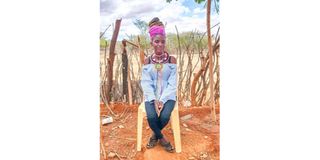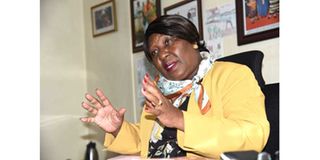Legal gaps, poor parenting driving high teen pregnancy rates

A teenage mother.
What you need to know:
- According to data released by the Ministry of Health in July, one in five adolescents aged 15–19 are already mothers or pregnant with their first child.
- Questions still linger as to why many sexual violence perpetrators are still roaming free and minimal, if any, convictions continue to be registered by courts.
Mary Serea Ntatuya fell pregnant when she was only 15. She was in Standard Eight.
She was broken and devastated and resolved not to speak about her predicament.
“The thought of being a mother at such a tender age had never crossed my mind,” says the resident of Rombo village in Kajiado South.

Mary Serea Ntateya from Rombo village in Kajiado South. She fell pregnant when she was only 15. Mary is now 19 and wants to pursue a course in health records once money is available. She currently does casual jobs in the village to take care of herself and her child.
During an interview with Nation.Africa, Mary, now 19, reveals that she sat her Kenya Certificate of Primary Education (KCPE) exam while heavily pregnant.
More trouble came her way as her boyfriend, a secondary school student at the time, abandoned her. Her father later refused to take her to secondary school after the results were announced, saying he feared she would fall pregnant again.
“I really wanted to proceed to secondary school, but my father stood his ground, saying he had lost confidence in me after I got pregnant in primary school.”
Determined to pursue her education, she went to seek help from village elders. Her plan worked as the elders prevailed upon her father, who reluctantly agreed to pay her school fees.
“I was so happy when I finally joined Form One. I studied under a lot of challenges, which included always being sent home for fees.”
Mary attended Rombo Girls Primary School where she scored 286 marks. She proceeded to Collin Davis Secondary School where she sat the Kenya Certificate of Secondary Education (KCSE) exam in 2020 and scored a D (plain).
The mother of one, however, says her secondary school journey was difficult, having been mired in mockery by fellow students over motherhood.
“My life in secondary school is one that I always wish to forget. I was neglected, ridiculed and looked down upon by the other students just because I had a child. They always referred to me as a mother. It was such a traumatising experience.”
Her dream is to pursue a course in health records so that she can hopefully in future get a job and take care of herself, the baby, and help her parents and siblings. However, her lack of college fees stand in her way. Nevertheless, she is optimistic that God will soon open a door to enable her to realise her dream.
The parents are pastoralists and the ongoing drought has only made life difficult after most of their emaciated animals died.
The remaining ones are staring at death if they are not urgently provided with the much needed food supplies.
Four of Mary’s seven siblings have acquired secondary education. The rest have not. Currently, Mary does casual jobs in the village, among them grazing cattle and tilling farms to raise money for her, and the child's, upkeep.
For Wilma Redenta, she was barely 18 in 2017 when she realised that she was pregnant. She had just joined a college in Nairobi to pursue a diploma in mass communication and was eager to have a successful media career.
Resuming studies
The pregnancy, therefore, came as a shock and a possible impediment to her dream.
“I thought it was going to be the end of the world for me. I did not know what to do next and I feared how my parents and my aunt, who was my guardian, would react. As a result, I went into depression just imagining that I had failed my parents.”

Wilma Redenta, who became pregnant while only aged 18 in 2017. Despite the setback, Redenta, from Archers Post in Samburu County, went back to college and finished her studies. She graduated in 2020 with a Diploma in Mass Communication and is now working with Pastoralist Child Foundation (PCF) as a communication officer.
Redenta tells Nation.Africa that as a result of the pregnancy, she was forced to cut short her studies and go back home at Archers Post in Samburu County where she nurtured the pregnancy and eventually gave birth.
“My aunt was very disappointed. She had brought me up and was paying my school fees. However, despite the disappointment I had caused her, she told me I could not afford to lose hope as getting pregnant was not the end of the road. This was very encouraging and gave me the courage that I badly needed at the time.”
Since she was three years old, Redenta says she has been staying with her aunt who has been taking care of her and paying for her education.
She says her parents, who are pastoralists, are usually affected by perennial drought and could not afford to take care of her education.
In 2018, she gave birth and stayed at home for one year to nurse her young baby. She, in 2019, left the child with her mother to resume her studies in Nairobi. She graduated in 2020 and now works with Pastoralist Child Foundation (PCF) as a communication officer.
PCF is an organisation championing prevention of female genital mutilation (FGM) and child marriage in Samburu.
She flatly refuses to talk about the man who impregnated her, saying it is not her wish to drag him into the matter.The mother of one reveals becoming a mother at such a tender age was not a walk in the park.
“I did not have a job as I was still a student, which means I did not have money to sustain myself and, therefore, depended on my aunt to take care of me and my baby. It felt really bad but here I was in this situation.”
She describes her child as a miracle baby, as she underwent a difficult pregnancy characterised by stress and frequent hospital visits. Her message to young girls is to abstain from sex until marriage. She is also appealing to parents and guardians whose daughters get pregnant to be compassionate enough to them.
“Getting pregnant should not, however, kill their dreams but just postpone them for a while. I am a living testament that despite falling pregnant, you can still go ahead and realise your dreams.”
The ordeals mirror those of thousands of other teenagers who get pregnant. Many of them are often forced to drop out of school to take care of their babies, thus abandoning their future dreams.
The issue of teenage pregnancy has of late become a thorny issue, with many Kenyans registering their concerns. The government recently released data that shows cases have risen at an alarming rate.This caused an uproar from both state and non-state actors, who called for immediate interventions.
According to data released by the Ministry of Health in July, one in five adolescents aged 15–19 are already mothers or pregnant with their first child.
Questions still linger as to why—despite the enactment of the Sexual Offences Act in 2006, which has been hailed as punitive—many sexual violence perpetrators are still roaming free and minimal, if any, convictions continue to be registered by courts.
According to the Act, a child below 18 cannot consent to sex. The Act says it is automatically a crime for anyone, of any age, to have sex with the under-18s.
If the victim is 16 or over, the sentence for the offender is at least 15 years in prison. If the victim is aged 12–15, the sentence is at least 20 years. A life sentence is prescribed for those violating children below 12 years.
Challenges
According to Peter Kemei, the head of operations at the Men End FGM Foundation, an organisation fighting child marriage and teenage pregnancies, some loopholes in the law are to blame for the increasing cases of teenage pregnancies and child marriage.
Kemei blames the gaps for the many perpetrators escaping justice. He, however, reveals they are working with the Office of Director of Public Prosecution and National Police Service to make offenders find it hard to evade punishment.

Peter Kemei, founding member and head of operations for Men End FGM, Kenya during an interview at his Westlands office in Nairobi on October 19, 2021.
Kemei, whose organisation has been at the forefront of the war on child marriage, FGM and teenage pregnancies, adds that Kangaroo courts are also the greatest impediment to justice.
“In some places, we are having instances where parents of girls impregnated and those of the boy or the man responsible negotiate to settle the matter before it moves to court. The parents of the girl are normally compensated using money or livestock and the man responsible being forced to marry the girl, thus denying them justice.”
Men End FGM Foundation is currently undertaking anti-teenage pregnancy and child marriage campaigns in Bungoma, Mt Elgon, Samburu, West Pokot and Migori counties.
Purity Gikunda, a leading crusader against teenage pregnancy, terms the problem a national crisis that needs urgent intervention to save many girls. Citing statistics, she says that from 2015, about 2.1 million girls across the country have dropped out of school because of teenage pregnancy. She faults absentee parents for being the major contributors.
“We are these days having parents who are not available for their children as they are too busy. They are not there to teach, guide and mentor their children who are now left to experiment things with their bodies.”
She expresses concern that many perpetrators remain free, thus leading to skyrocketing cases. “Many perpetrators, some of whom are senior government officials or members of society, go scot-free. We need to end this impunity and make them face the law and ensure justice for victims and survivors is served."
Ms Gikunda is the founder of Greenland Girls School in Kajiado East that is home to teenage mothers and pregnant girls. She says that in Kajiado County alone, about 8,000 girls have dropped out of school after becoming pregnant. To tame this menace, Ms Gikunda opines that very serious interventions are needed by state and non-state actors.
“We need to re-look at the law. These children are discriminated against, isolated by the law and ignored by society. They also face a lot of stigma and discrimination from fellow learners and teachers who normally mock and backbite them,” Ms Gikunda adds.
Moral values
Maendeleo ya Wanawake Organisation (MYWO) chairperson Rahab Muiu has also waded into the matter, calling for immediate interventions. “It is morally wrong to be talking about a 10-year-old being a mother. We need to go back to our moral values to avoid such things happening to our girls,” she says.
Ms Muiu, in an interview with Nation.Africa, is challenging parents and grandparents to rise up to the occasion and talk to their children and grandchildren on the importance of moral values.

Maendeleo ya Wanawake chairperson Rahab Mwikali Muiu during an interview at her Maendeleo House office in Nairobi on July 18, 2022.
“Uncles, aunties and the church also need to do what they are supposed to do, talking to these young girls and mentoring them. The church should also guide the young parents to inculcate in them proper parenting values, which is lacking in some.”
She is calling on women leaders to rise up and spearhead the fight against teenage pregnancy. She noted the need to have comprehensive sex education in schools to emphasise, among other things, the benefits of abstinence until learners are through with their studies.
“We need to go back to our schools and spread the message of abstinence to these young girls and boys. They must be told what they must hear if we want to fight this menace.”
National Gender and Equality Commission (NGEC) chairperson Joyce Mutinda says they are seeking to engage women representatives and governors to push for laws and budgetary allocations to fight sexual and gender-based violence.
“We will be pushing for women representatives to have a special kitty to fight sexual and gender-based violence, including teenage pregnancy,” Dr Mutinda says.
To deal with the rising cases of teenage pregnancy in the country, the Ministry of Health in July launched a national campaign dubbed ‘End the Triple Threat in Adolescents’. The campaign seeks to reduce the risk of HIV infection, pregnancies and SGBV that persistently undermine girls’ health, education and economic empowerment.
Speaking during a sensitisation meeting for community gatekeepers in Nairobi recently, Health Principal Secretary Susan Mochache said teenage pregnancies point to rampant unprotected sex. She revealed that about 21 per cent, totalling 317,644, of all pregnancies in 2021 were among adolescents aged 10–19.
“In Kenya, the painful truth is that one out of every three mothers attending an antenatal clinic is an adolescent aged 10–19. We also know that one in three of our adolescent and young girls under the age of 18 have experienced some form of violence, including sexual and gender-based violence.”
PS Mochache noted that 56 per cent of all teenage pregnancies in 2021, totalling 20,803, were in nine counties–Nairobi, Kajiado, Homa Bay, Meru, Kericho, Narok, Kisii, Mandera and Bomet.
She said the strategy to contain ills against girls and women include having “a prevention lens that involves individuals, families and communities”.
The onset of Covid-19 in the country in March 2020 saw a sharp rise in teenage pregnancies and GBV against girls and women as schools remained closed in a bid to contain the disease.
This story has been supported by Journalists for Human Rights (JHR) under its Voice for Women and Girls Rights project.



